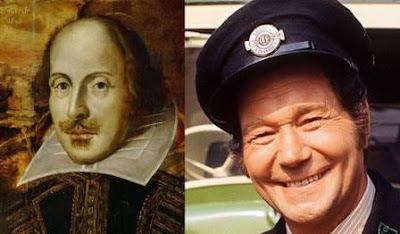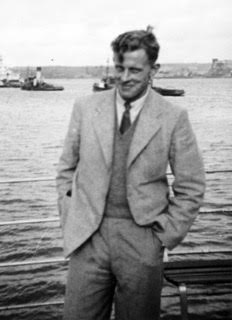Shakespeare and On the Buses?
So here’s a bit of what I’ve found during the research
for my forthcoming booklet about Reg Varney which will accompany the 2016
exhibition ‘Our Little Clown’ at Fairlynch Museum.
Yes, Reg did indeed play Shakespeare. Here he is as the clown or ‘wise fool’ Touchstone, a performance for which he won praise in a 1953 production of As You Like It at the celebrated Mermaid Theatre.
The above booklet, published in 1951 and found among Reg's papers, tells the story of the 20th-century Mermaid Theatre, the life's work of actor Bernard Miles with his wife, Josephine Wilson. His original Mermaid Theatre was a large barn at his house in the St. John's Wood area of London. This seated 200 people, and during 1951 and 1952 was used for concerts, plays and a celebrated opera production of Dido and Aeneas. For the third season in 1953 the Mermaid Theatre was moved to the Royal Exchange in London
Of course he’s not the only comic actor who’s played Shakespeare. Ten years later, Benny Hill would win plaudits for his own portrayal of Bottom in A Midsummer Night's Dream.
Thanks to Reg’s daughter Jeanne I’ve been able to go through some of his papers and photos, including the scrapbook that he kept of reviews of his early shows.
Thanks to Reg’s daughter Jeanne I’ve been able to go through some of his papers and photos, including the scrapbook that he kept of reviews of his early shows.
One of these which
brought him stardom was called The
Boltons Revue. It opened on 26 December 1947 at the Boltons Theatre Club. The
Revue’s success allowed Reg to move to the West End stage after years of
performing in East End working men’s clubs and entertaining troops during WW2. He obviously thought it was a breakthrough in
his career as he kept just about every review of the show, marking all the
glowing references to his own performance in the margin.
A scene from one of Reg's wartime REME Revels reminiscent of one of the It ain't half hot Mum TV shows. Reg is second from the left
The Boltons Theatre, which had opened on 15 Jan 1947, had a reputation for staging avant-garde or daring productions. The building in Drayton Gardens, South Kensington, had started life in 1911 as the Boltons Picture Playhouse. It was taken over after WW2 by a couple of ex-servicemen, Gunner John Wyse, a former Shakespearean actor and director, and 2nd Lt. Denis Blanckensee. Like Reg they had provided wartime entertainment for troops, and in the post-war period the Boltons Theatre policy was to cast ex-servicemen and women to help revive their careers.
A second important aim was to present only new plays, as opposed
to revivals. Inevitably such a policy would mean that it would be in constant
conflict with the system of censorship imposed by the Lord Chamberlain. For
that reason it had to exist as a theatre club, the advantage being that it was
not subject to the archaic licensing laws of the time.
The theatre opened with what was described as a comedy with a musical background entitled The Lake of the Swans. That was followed by the premiere of William Douglas Home’s Now Barrabas, described in retrospect as ‘powerful stuff for the West End in 1947.’ The play was based on the author’s experience in gaol following his court-martial and sentencing to a year’s imprisonment with hard labour in October 1944. He was punished for refusing to carry out military orders during the Allied attack on the French town of Le Havre, orders which in his view would have resulted in the deaths of thousands of civilians. Among the cast of the 1949 film version was a young Richard Burton.
The theatre opened with what was described as a comedy with a musical background entitled The Lake of the Swans. That was followed by the premiere of William Douglas Home’s Now Barrabas, described in retrospect as ‘powerful stuff for the West End in 1947.’ The play was based on the author’s experience in gaol following his court-martial and sentencing to a year’s imprisonment with hard labour in October 1944. He was punished for refusing to carry out military orders during the Allied attack on the French town of Le Havre, orders which in his view would have resulted in the deaths of thousands of civilians. Among the cast of the 1949 film version was a young Richard Burton.
A few months before The Boltons Revue opened, the theatre had
staged The Hidden Years by Travers Otway, a pseudonym for
Edward J. Miller. The play dealt with
the theme of homosexuality in public schools. A later production in August 1948 was Leslie
and Sewell Stokes’ play Oscar Wilde which
had been banned from public release by the Lord Chamberlain because of its
sympathetic portrayal of the central character.
This cartoon by Arthur Ferrier, showing three members of the cast of the Boltons Revue was published in the weekly magazine Everybody’s, on 7 February 1948
The Revue itself, though praised for its wit and lightheartedness, was notable for its lampooning of topical targets, including the Edwardian stuffiness which still prevailed in the 1940s.
What struck audiences and reviewers about Reg’s performance was his clever use of facial gestures for comic effect. They recognised the impish quality that he brought to the stage, characteristic of the wise clowning seen in Shakespeare’s work. Equipped with a face that had, as one reviewer put it in 1948, ‘the malleability of rubber and the Puckishness of Puck’, Reg was ideally suited to play the role of a witty observer of human folly, encouraging audiences to reflect again and again: ‘Lord, what fools these mortals be!’
He had after all been specially chosen by the Revue’s director
Billy Milton who spotted the future On
the Buses star one night while performing at the Nuffield Club, a centre for
ex-servicemen in London. According to an
article in the Evening News, Reg ‘nearly missed discovery.’ Milton was
sitting on the side, just before the Centre closed, when Reg turned his way and
grinned. ‘That grin got him an invitation to join this revue,’ explained
Milton. ‘Fate works strangely in show business.’
Director Bernard Miles — later to be honoured as Baron Miles of Blackfriars CBE — who invited Reg to take the part of Touchstone in his production of As You Like It was in no doubt of his ability.
Another shot of Reg as Shakespeare's clown Touchstone
Reg was, he told the audience of
Eamonn Andrews’ This Is Your Life on 20 May 1970, ‘in my opinion one of
the very finest Shakespearean clowns in living memory... He’s got a funny face,
a marvellous ear for dialogue and he’s a great technician… He really should be
at the National Theatre, but the box has claimed him. It’s their loss…’
On 9 March 1948 the Revue
transferred from The Boltons to St James’s, a grand 1,200-seat theatre at the
heart of the West End. Reg had most definitely arrived!










Comments
Post a Comment